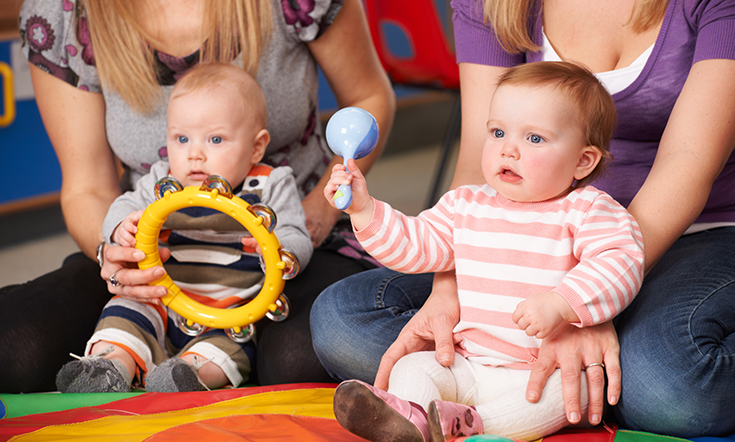

Music plays a key role in supporting a baby’s development into toddlerhood and early childhood. Here are five reasons you should have a musical household when you have a baby in the house.
Music for Babies will Help Improve Literacy and Numeracy
We are hardwired to decode sounds and words and music can assist with this process, and enhances those natural abilities. Because babies love music it is an easy way to engage them in the learning process without purposefully teaching them. At its most basic level it is a way for babies to start recognising patterns and practising those patterns through the repetition of songs and nursery rhymes.
Research shows the use of rythym memory is improved. Counting songs such as One Two Buckle My Shoe taps into rhythm, repetition and numeracy. These songs foster anticipation of what’s coming next; they also help to put those patterns into sequence. The practice of these very early sequencing skills are the stepping stones to literacy and numeracy.
Music is a Mood Lifter and helps Regulate Emotion
Most carers will have used music to calm their baby and signal that it is bedtime. Music can also be used as tool for play, to increase energy and create a sense of fun. Using upbeat music such as will signify play, and adults can use specific songs to signal daily tasks. For example the ‘Pack Up’ song prior to dinner or bath time.
Singing can be the Building Blocks of Vocabulary
Story-telling is a big part of music and initially babies won’t understand the words, the understanding grows through the reputations and as they grow their understanding of the story in the song improves. For example, the ABC song will sound like “elemenopee’. But then pattern will emerge and eventually they will see that each letter is a separate.
Singing your baby’s favourite nursery rhymes and inserting their name into the song, or changing the words within a familiar nursery rhyme will capture their attention and keep them engaged and learning.
Music helps build Rythym and Coordination
Musical will help build coordination. We are naturally inclined to move to music, even simple movements such as head nodding or bouncing on bottoms is helping with coordination. Play put to music feeds into this inclination to move. Giving a baby a toy drum will help with both fine and gross motor skills, and hand-eye coordination.
Music for Babies will aid the Development of Social Skills and Attention span
Group music sessions in particular, are excellent for developing social skills. Making music as a group will be their first experience of team work. A group session also teaches cooperation, listening skills, and helps work on attention span. It doesn’t necessarily have to be in an organised group, these skills and benefits can still be experienced through parent and sibling involvement.
What Parents Can Do
Bringing music into your baby’s everyday life doesn’t have to involve a massive time or financial commitment. Many parents may feel self-conscious about their singing voice, or their ability to play an instrument, but every child believes that their mother has a beautiful voice and benefits enormously from hearing her sing.
Parenting is naturally musically-based; changing the rythym and tone of our voice when communicating with babies, using rhythmic shushing and patting to soothe calm.
Activities don’t have to be planned out in advance or structured, it can be as easy as putting on your favourite playlist of fun songs while they play, or making ad hoc music with a pot and wooden spoon. Using music in the home reaps ongoing intellectual, emotional and physical benefits, for both parents and babies.























